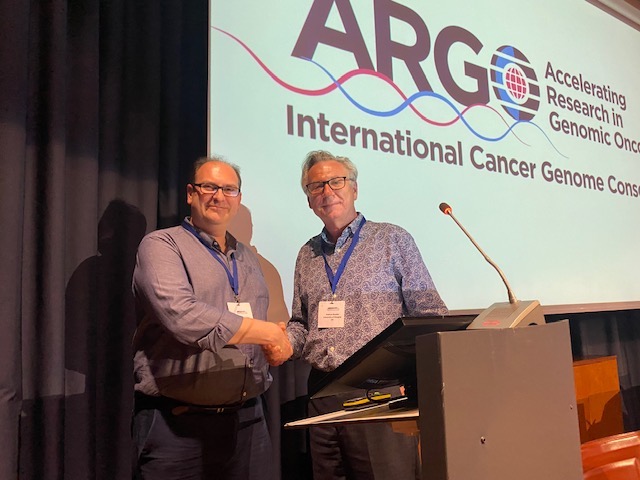 Lancet Oncology Managing Editor David Collingridge and ICGC Executive Director Andrew Biankin announcing the kick-off of the ICGC at the 18th ICGC Scientific Workshop.
Lancet Oncology Managing Editor David Collingridge and ICGC Executive Director Andrew Biankin announcing the kick-off of the ICGC at the 18th ICGC Scientific Workshop.
Today, marked by a publication in The Lancet Oncology journal ICGC ARGO sets out its mission to enable equitable, fair and diverse precision oncology for all.
The newly formed commission will start by examining some of the biggest challenges faced by healthcare systems and cancer clinicians worldwide for the widespread adoption of molecular testing in routine clinical care. The team of international experts, lead by The Lancet Oncology Commission will be coordinated by the International Cancer Genome Consortium: Accelerating Research in Genomic Oncology (ICGC-ARGO) initiative will offer practical solutions to ensure sustainable and equitable access and advancement for cancer diagnosis and treatment.
The commission will analyse the challenges that impede accumulation of health and genomic data that can be shared in an appropriate way to refine current best practice and inform ongoing therapeutic development.
A rapidly increasing proportion of contemporary cancer care relies on a precision oncology strategy – the process of using molecular testing to understand a patient’s tumour and how to successfully target the cancer cells within it. Oncologists can use the results of these tests to select the best available treatment options for each patient, ultimately improving survival and quality of life. Molecular testing can also help identify hereditary cancer syndromes providing the opportunity to reduce cancer mortality through personalised prevention.
However, the majority of patients with cancer around the world, particularly those living in lower-and middle-income countries, cannot access molecular testing due to a range of issues including regulatory, financial, logistical, educational and clinical barriers. It is envisaged that this international consortium of experts will define solutions to these key problems, and ultimately help improve cancer care for patients around the world.
The Commission brings together international stakeholders with relevant expertise across a range of priorities that collectively define how precision cancer medicine can be implemented in a feasible and affordable way; how cancer omics data can be retained in a more sustainable and accessible manner; be shared more widely; and be better used for the benefit of people affected by cancer.
The organisations involved include the European Society for Medical Oncology (ESMO), the International Agency for Research on Cancer (IARC/WHO), Latin American Cooperative Oncology Group (LACOG), African Organisation for Research and Training in Cancer, the Asian Oncology Society (AOS), the Global Alliance for Genomic and Health (GA4GH), the International Quality Network for Pathology (IQN Path), the U.S. Food and Drug Administration (FDA), and many others.
Director of ICGC ARGO Professor Andrew Biankin, Regius Chair of Surgery at the University of Glasgow, said: “We have made great progress in defining the genomic aberrations that cause and drive cancer, and are developing more and more treatments that directly target these cancer-causing molecular abnormalities. Yet these great advances are only reaching a small proportion of people even in developed countries.
“The time has come to incorporate broad genomic testing in routine cancer care. This will improve outcomes by using current treatments better through predicting who they will work for and for whom they won’t before giving a treatment. This will avoid the use of ineffective treatments, minimising side-effects and costs and providing better access for patients to new treatments and clinical trials.”
Dr Raffaella Casolino, a pancreatic cancer expert from the University of Glasgow’s School of Cancer Sciences and chair of the Commission, said: “This Commission has the ambitious goal of improving the lives of people affected by cancer and their families driving the evolution of precision oncology over the next decades. Collaboration between stakeholders from different disciplines and countries, including engagement with the public, patients, and their families, together with attention to the policy of diversity, equity and inclusion, represent the fundamentals of this Commission and will be critical to achieve the intended goals. Cancer burden is doubling by 2040 and health disparities are major drivers of inequalities in outcomes both within and between countries. It is only through a global approach that we can reduce the burden of cancer. And this represents the strength of our initiative through which we really hope to impact at a scale.”
Details of the The Lancet Oncology Commission, following publication, can be found here.
For more information on the ICGC ARGO Lancet Oncology Commission please visit our Commission page.
Adapted from The University of Glasgow press release: For more information contact Elizabeth McMeekin or Ali Howard in the University of Glasgow Communications and Public Affairs Office on 0141 330 4831 or 0141 330 6557; or email Elizabeth.mcmeekin@glasgow.ac.uk or ali.howard@glasgow.ac.uk